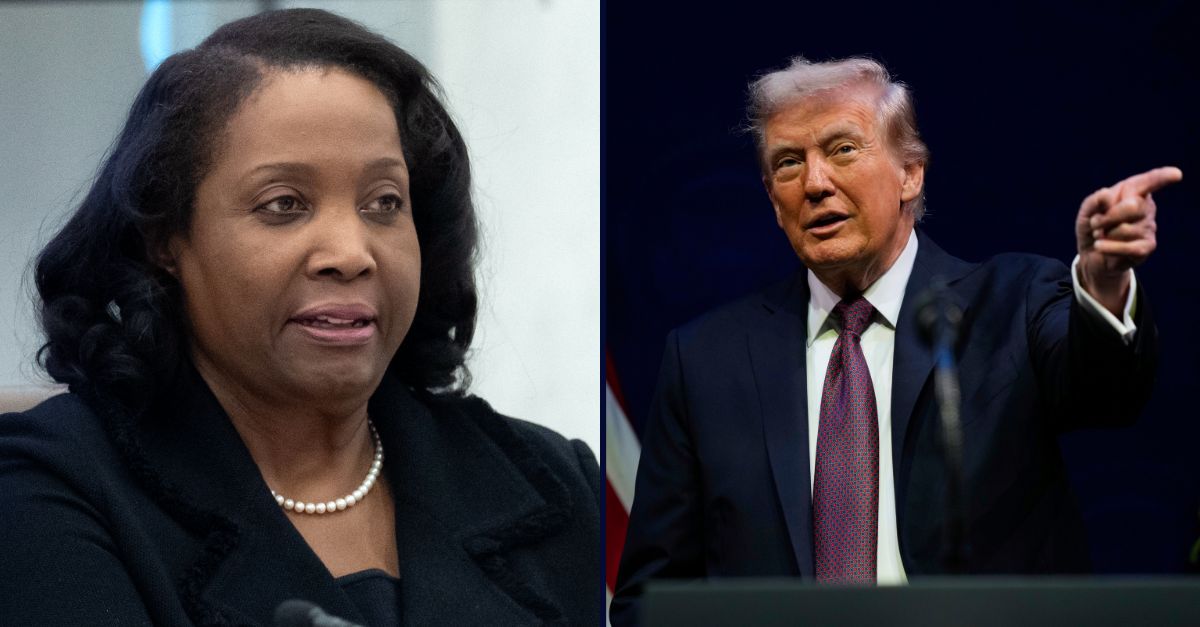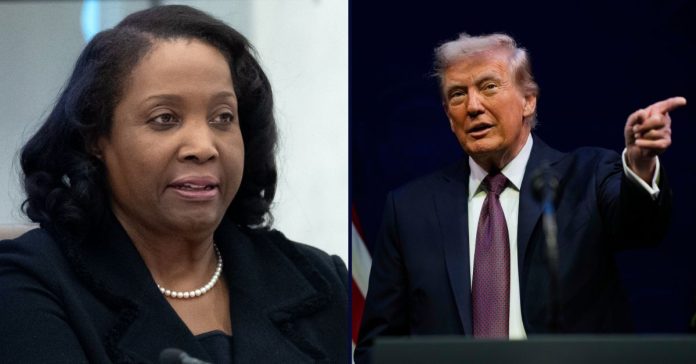
Left: Federal Reserve Board of Governors member Lisa Cook listens during an open meeting of the Board of Governors at the Federal Reserve, June 25, 2025, in Washington (AP Photo/Mark Schiefelbein, File). Right: President Donald Trump speaks at a hearing of the Religious Liberty Commission at the Museum of the Bible, Monday, Sept. 8, 2025, in Washington (AP Photo/Alex Brandon).
With an appellate court declining Monday to go along with President Donald Trump”s firing of Federal Reserve Board governor Lisa Cook on the basis of alleged but unadjudicated mortgage fraud accusations, the DOJ has asked the U.S. Supreme Court to step in and grant yet another administrative stay.
The U.S. Court of Appeals for the District of Columbia Circuit, in a 2-1 decision at the start of the week, said the Trump administration failed to meet the “stringent requirements for a stay pending appeal” of a lower court’s injunction, which barred Cook’s ouster.
The panel reached this conclusion with only U.S. Circuit Judge Gregory Katsas, a Trump appointee, dissenting and stating he would have granted a stay.
Katsas explained his view that Cook’s “apparent misrepresentations […] in applying for home mortgages” — as highlighted in Federal Housing Finance Agency Director Bill Pulte’s criminal referral to the DOJ — could support “for-cause removal from office” although the alleged conduct stems from before her confirmation to the board.
The circuit judge stated that U.S. District Judge Jia Cobb, a 2021 appointee of President Joe Biden, was “mistaken” in holding otherwise and was also wrong that Cook “enjoys a constitutionally protected property interest in her office.”
“In my view, both holdings are mistaken, and the equitable balance here tips in favor of the government,” he wrote.
Katsas’ view featured prominently in U.S. Solicitor General D. John Sauer’s request to SCOTUS for an administrative stay. In fact, the judge was shouted out by name on the second page.
“To this day, Cook has never attempted to reconcile these representations or offered any substantive justification,” the DOJ said. “The district court nonetheless issued a preliminary injunction reinstating Cook, and a divided D.C. Circuit panel refused to stay that order.”
“As Judge Katsas’s dissent explained,” the government continued, “those decisions flout many strands of this Court’s precedents, from removal to due process to the equities. The injunction should be stayed.”
Love true crime? Sign up for our newsletter, The Law&Crime Docket, to get the latest real-life crime stories delivered right to your inbox
Before the D.C. Circuit’s rejection, the Trump administration had asked that the appellate court put Cook on the outside looking in ahead of a meeting of the Federal Open Market Committee.
The government cited the U.S. Supreme Court’s recent order that allowed, for the time being, Trump to fire FTC Commissioner Rebecca Kelly Slaughter, with potential implications for the SCOTUS precedent known as Humphrey’s Executor that Law&Crime previously covered as it related to Cook’s case.
Claiming Cobb made “a series of legal errors” in an “extraordinary” affront to Trump’s “exercise of his Article II authority,” the administration claimed “evidence” that Cook “applied for two loans for her personal benefit, and was able to obtain favorable interest rates by misrepresenting where she lived” put her “trustworthiness” in question and was sufficient for establishing “cause” for firing.
Sauer hammered away on these points again in his brief — that SCOTUS should issue an administrative stay as it did in the Slaughter firing case and that Trump’s determinations about Cook’s “conduct, ability, fitness, or competence” to serve are within the “President’s unreviewable discretion.”
While acknowledging that removal without cause and removal based on mere policy disagreement aren’t permitted under the law, the administration nonetheless maintains Trump’s cited “cause” is unquestionable.
Put another way, an ally of the president can make a criminal referral that the president then relies on to establish “cause” and that determination of “cause” can’t be reviewed by the courts, according to the DOJ.
“The President’s strong concerns about the appearance of mortgage fraud, based on facially contradictory representations made to obtain mortgages by someone whose job is to set interest rates that affect Americans’ mortgages, satisfies any conception of cause,” the brief said. “That is especially true here, where Cook has not disputed any material fact or offered any plausible justification for her conduct.”
As in other cases, the DOJ asserted that “[e]ven if judicial review of the President’s stated cause” for firing Cook “were available,” the courts must still be “highly deferential” to Trump.
“That the Federal Reserve Board plays a uniquely important role in the American economy only heightens the government’s and the public’s interest in ensuring that an ethically compromised member does not continue wielding its vast powers,” the filing said. “Put simply, the President may reasonably determine that interest rates paid by the American people should not be set by a Governor who appears to have lied about facts material to the interest rates she secured for herself—and refuses to explain the apparent misrepresentations.”
“This Court should stay the district court’s deeply flawed preliminary injunction and should grant an immediate administrative stay,” the government concluded.
Cook’s attorneys have said that allowing Trump to “unlawfully remove Governor Cook on unsubstantiated and vague allegations” she denies “would endanger the stability of our financial system and undermine the rule of law” — by green-lighting political interference at the independent Federal Reserve as the president has openly pressured Fed chair Jerome Powell to cut interest rates.

